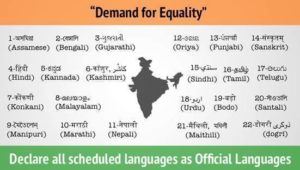Another BP Podcast is up. You can listen on Libsyn, iTunes, Spotify, and Stitcher. Probably the easiest way to keep up the podcast since we don’t have a regular schedule is to subscribe at one of the links above.
Professor Majeed and Xerxes discuss linguistic sub-nationalism and the all important Grierson survey in establishing it.
As many viewers will probably notice that many of my interest veer towards language politics (episode 49). Professor Majeed was very forthcoming and gave the background to how linguistic regionalism began to soon complement the intense communalism in pre-independence India.
Many Punditeers usually suggest that x & x language will die out (Telugu, Kannada, Tamil etc), which is hyperbolic.
Languages in India are very healthy
As Daniyal Shoaib said in Episode 49 even Bhojpuri, Mathili and Braj are very healthy. The point of linguistic states is that language survival is pretty much guaranteed but in a Hinglish milieu will there be sufficient language sophistication.
It remains to be seen how much of North India will reconfigure linguistically but the great victory of the Sikhs has been to ensure that Punjabi is a very vigorous and influential language in India, in a way that it is not in Pakistan (though having nearly 3x the speakers there if one includes Saraki & Hindko).
Saraki is probably going to be the biggest transformation of the Pakistani polity- I can’t imagine a separate Saraikistan agreeing to keep Urdu as the provincial language in the same way Punjab, KPK and Baluchistan (all of which are diverse states) have done.
The languages that are threatened are Sindhi in India (Sindhi in Pakistan is the most vigorous linguistic sub-nationalism in South Asia, on par with Tamil), Kashmiri (Urdu has supplanted it for generations) and other minority tongues that are stateless (maybe Tulu and so on). The Adivasis languages are under threat by other state languages as their populations being to mainstream to regional (as opposed to national culture).
Hindi as Stem and Urdu as humanities
Anecdotally I’ve noticed that Hindi does science and prose pretty well while Urdu is sort of the saccharine romantic niche. It mirrors, to a certain extent, Indian history where the pre-Islamic period seems much more science focused while the Muslim period, the Imperium is more focussed into art, decadence and warfare (the Muslim kept up to date with trade and military technology).
However where Urdu fails in the realm of science equally one can’t accuse the Hindi language of either poetic or particularly pleasant. As Shoaib points out it’s the Urdufied Hindustani that has rapidly disseminated Hindi across India (along with it’s standardisation in schools) but it creates a paradox where Hindi speakers are aware of a prettier linguistic register of the same language, which by and large they can understand but not speak.
Persian as both Art & Science
Of course Persian, which has never been externalised or colonised (though Iran was under the colonial sphere and Persian has had some French lexical influence) by European powers is able to unify both the scientific and artistic arms. English seems to have by and large replaced the role of Persian in the Subcontinent whereas demotic Hindustani (in the Urdu & Hindi register) occupies pretty much the same role in both India & Pakistan.
plus ca change..
Bangladesh:
The only *healthy* country in South Asian incidentally seems to be Bangladesh, with a strikingly homogeneous religious, cultural and linguistic profile. It would be interesting to understand the interplay between Dhaka and Calcutta, Bengali supra-nationalism and if there are any existential questions that plague the Bangladeshi intelligentsia.
Pakistan is essentially all angst and it rapidly seems India is following that path. Some friends of mine, Kashmiri activists who are in the Ivies, visited Cam yesterday. I asked them to come on the podcast but they seemed reluctant/afraid.
One of my peculiar gifts is that being rootless I can glide the chasm of TNT effortlessly. People from both sides will identify me as some sort of kin, distant but *on their side.*
Kashmir- The Mountaintop Bangladesh?
There is a particular weight on the soul that occupation has that these proud Kashmiris had. As I like to imagine Kashmir is the Alsace-Lorraine of Pakistan; it’s a part of the psychic make-up of the nation but like the Alsatians the Kashmiris have indelible links to India. They are socialised in a Hindu(ish) national culture in a way Pakistanis simply are not. It’s difficult to explain but the difference is there.
The feeling that even if you alone are free your people are not. It may just be that one day the Valley may emerge as a Bangladesh on the Mountaintops. Completely neutralised (militarily) by India but *forced* instead to focus on its relative economic strengths and the quest for prosperity. Such a fate political independence but geopolitical dependence on India may be the only solution left for these restive peoples. Kashmiri nationalism has tail-spun to such an extent that even Pakistan is almost as foreign as India is..
You can also support the podcast as a patron (the primary benefit now is that you get the podcasts considerably earlier than everyone else…). Would appreciate more positive reviews.

~The only *healthy* country in South Asian incidentally seems to be Bangladesh, with a striking religious, cultural and linguistic “homogeneity”
Fixed that for you. 🙂
Danke!
I know you are joking somewhat. But just in case you’re not, Bangladeshi Hindus I have spoken to in the UK are not happy with the status quo. They suffer in silence. I guess it would be too idealistic to expect a completely fair society in a Muslim majority country.
Hmmm then why did % of Hindus reduce from 22% to 9% the last 70 years?
This was really insightful. Hope to see a South Indian voice represented in some of these South Asian language-related episodes. It’s an important perspective in South Asian language-related matters.